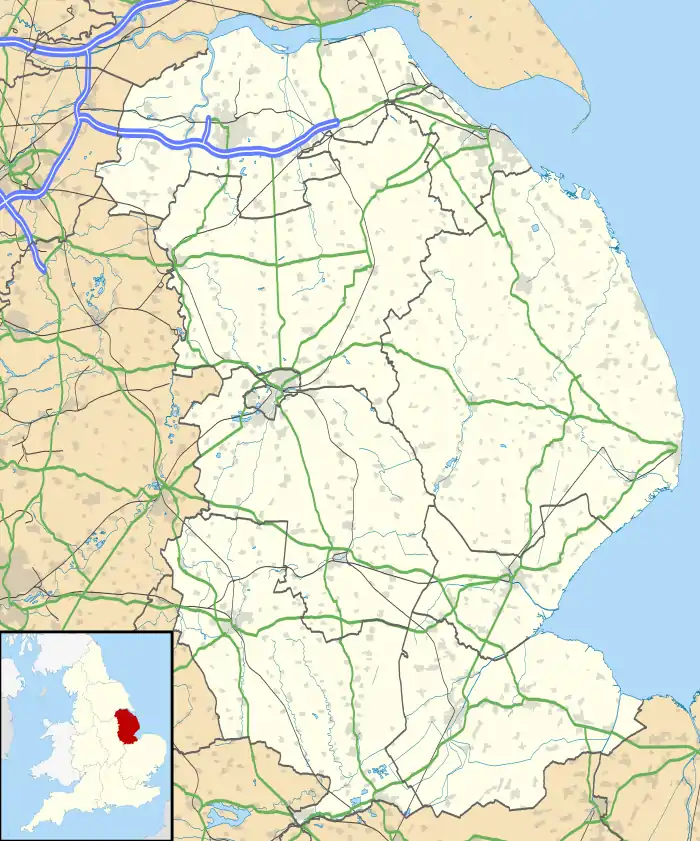Irby upon Humber
Irby upon Humber or Irby-on-Humber is a small village and (as just Irby[1]) a civil parish in North East Lincolnshire, England. The village is situated on the A46 road, 1.5 miles (2.4 km) south-west of Laceby.
| Irby upon Humber | |
|---|---|
 St Andrew's Church, Irby | |
 Irby upon Humber Location within Lincolnshire | |
| Population | 128 (2011) |
| OS grid reference | TA195048 |
| • London | 140 mi (230 km) S |
| Civil parish |
|
| District | |
| Shire county | |
| Region | |
| Country | England |
| Sovereign state | United Kingdom |
| Post town | Grimsby |
| Postcode district | DN37 |
| Police | Humberside |
| Fire | Humberside |
| Ambulance | East Midlands |
| UK Parliament | |
Village population at the 2001 census was 124,[2] increasing to 128 at the 2011 Census.[3] The residence of the Bishop of Grimsby is at Irby.[4]
History
The village shares part of its name with other places in England such as Irby in the Marsh and Irby, Merseyside. David Mills in A Dictionary of British Place-Names gives the meaning of Irby as 'settlement or village of the Irish'.[5]
In the 11th century Domesday Book, Irby's population of 11 villagers, 7 smallholders, 52 freemen, in over 70 households, was considered 'very large'.[6] St Andrew's Church, with 12th century nave features and a 13-14th century tower, was built on the site of an earlier church mentioned in the Domesday record.[7]
Denzil Holles, a grandson of the Lord Mayor of London William Holles, was given the manor of Irby by his father, on the occasion of his marriage to Eleanor, daughter of Edmund Sheffield, 1st Baron Sheffield, in the mid-16th century.[8] Holles was not an absentee landlord, spending much of his time in Irby, and the baptisms of at least five of his children are recorded in the parish registers.[8] He made numerous improvements to the estate and was in the process of constructing a new manor house when he died in 1591.[8]
Writing in the 1600s, when the estate was owned by Denzel's son John Holles, 1st Earl of Clare, cousin Gervase Holles described it as:[9]
...a place happy in the sweetness of the air and very delightful by the pleasant hills and dales, where there are dry and inviting walks both summer and winter, with a welcome prospect towards the sea; affording as good hawking and hunting, and as good conveniency for training and airing young horses, as can be found anywhere.
In 1840, Irby and the surrounding parish had 263 inhabitants and a notable local industry was chalk quarrying in the area of the Dale.[10]
References
- "Irby". Ordnance Survey. Retrieved 11 November 2021.
- "Parish Headcounts: North East Lincolnshire (Unitary Authority)". Neighbourhood Statistics. Office for National Statistics. Archived from the original on 26 May 2011. Retrieved 28 March 2009.
- "Civil Parish population 2011". Neighbourhood Statistics. Office for National Statistics. Archived from the original on 4 March 2016. Retrieved 17 August 2015.
- "Suffragan Bishop of Grimsby". The Anglican Communion Official Website. Anglican Consultative Council. Retrieved 28 March 2009.
- David Mills (20 October 2011). A Dictionary of British Place-Names. Oxford University Press. p. 258. ISBN 978-0-19-960908-6.
- Irby Upon Humber in the Domesday Book. Retrieved 6 November 2014.
- Historic England. "St Andrew's Church (80299)". Research records (formerly PastScape). Retrieved 6 November 2014.
- "HOLLES, Denzil (c.1538-90), of Irby-on-Humber, Lincs". The History of Parliament. Retrieved 9 November 2014.
- Biographia Britannica: Or, The Lives of the Most Eminent Persons who Have Flourished in Great Britain and Ireland, from the Earliest Ages, Down to the Present Times: Collected from the Best Authorities, Both Printed and Manuscript, and Digested in the Manner of Mr. Bayle's Historical and Critical Dictionary ... Olms. 1757. pp. 2635–2636.
- Samuel Lewis (1840). A Topographical Dictionary of England, Comprising the Several Counties ... S. Lewis and Company. p. 510.
External links
 Media related to Irby upon Humber at Wikimedia Commons
Media related to Irby upon Humber at Wikimedia Commons